Home » Achievements » Faculty (Page 2)
Category Archives: Faculty
Recent Posts
- Strengthening Industry Collaboration: CSE Hosts IAB Meeting for CS and CE Programs
- CSE Students Secure First Place at Snoonu Hackathon 2026
- CSE Faculties Receive Grants on Institutional Collaboration between Qatar University & Khalifa University
- Computer Engineering Practicum Demo Day & Contest (4th Edition)
- CSE faculty receives research funding from Google
Archives
- January 2026
- December 2025
- November 2025
- September 2025
- August 2025
- May 2025
- February 2025
- January 2025
- December 2024
- November 2024
- September 2024
- June 2024
- May 2024
- April 2024
- March 2024
- February 2024
- January 2024
- December 2023
- November 2023
- October 2023
- September 2023
- June 2023
- May 2023
- April 2023
- March 2023
- February 2023
- January 2023
- December 2022
- November 2022
- October 2022
- September 2022
- August 2022
- May 2022
- April 2022
- March 2022
- February 2022
- January 2022
- December 2021
- November 2021
- October 2021
- September 2021
- August 2021
- July 2021
- May 2021
- April 2021
- March 2021
- February 2021
- January 2021
- December 2020
- November 2020
- October 2020
- September 2020
- August 2020
Categories
CSE Team Shines at Innovators in Education with AI-Powered Project “Faheem”
A team from the Department of Computer Science and Engineering earned the first place at the “Innovators in Education” event, organized by the College of Education in partnership with the Colleges of Engineering and Business at Qatar University, and proudly sponsored by ExxonMobil.
The award-winning team, comprising Dr. Saleh Alhazbi and senior students Marwan Sayed and Osama Hardan, presented their groundbreaking project titled “Faheem: An AI-Powered Platform to Learn Coding.”
Faheem is a smart educational platform that transforms the way students learn programming by offering an engaging and personalized experience. It includes concise instructional videos, automatically generated quizzes, and an AI-powered chatbot that interacts with learners in natural language. The platform also provides hands-on coding exercises, step-by-step guidance, performance evaluation, and adaptive feedback tailored to each student’s level—creating a fully immersive and individualized learning journey.
Warm congratulations to the team on this remarkable accomplishment!


CSE faculty gives a keynote speech on AI applications in the Oil and Gas industry
December 1, 2024 / Leave a comment
Prof. Khaled Shaban participated as a keynote speaker and panelist in a workshop titled “Decarbonization and Energy Transition in the Oil and Gas Industry,” organized by the Gas Processing Center at Qatar University on Sunday, December 1, 2024. The workshop provided a vital platform to discuss the transformative role of advanced technologies in addressing the industry’s most pressing challenges.
Prof. Shaban delivered a keynote presentation on “AI and ML: Catalysts for Digital Transformation in the Oil and Gas Industry,” highlighting how artificial intelligence and machine learning are revolutionizing operations by driving efficiency, sustainability, and innovation. The presentation offered valuable insights into key applications, such as autonomous drilling, predictive maintenance, and supply chain optimization, along with actionable strategies to address challenges like data quality issues and resistance to change.

Following the keynote, Prof. Shaban contributed as a panelist, engaging with industry leaders and academics to explore collaborative approaches for implementing AI/ML technologies. The discussions emphasized their potential to enhance operational agility and environmental compliance. His participation underscores a strong commitment to fostering innovation and shaping the future of energy through cutting-edge research and practical solutions.
CSE faculties awarded QU grants
November 25, 2024 / Leave a comment
Three of our faculty members (Prof. Amr Mohmed, Dr. Moutaz Saleh and Dr. Ahmed Badawy) and their research teams have just been been awarded QU internal grants (Cycle 8) in the different categories.
Here are more details about the winning projects:
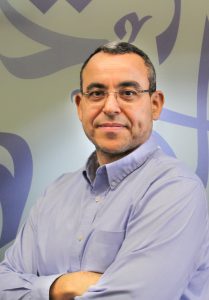
Project Team: Dr. Amr Mohamed
Project Title: “Next-Gen Health Systems: AI-Driven Edge Platform for Autonomous healthcare services”
Grant Category: Post-Doc grant
Project Abstract: Promoting smart and secure healthcare services is instrumental in ensuring that Qatari citizens receive efficient, timely, and high-quality healthcare, ultimately contributing to an improved quality of life. Coinciding with this vision, this project aims to adopt recent communication and Artificial Intelligence (AI) technologies, such as distributed collaborative learning, edge computing, and network function virtualization (NFV) to fulfil challenging healthcare services’ requirements. The proposed platform will integrate different, distributed AI schemes in healthcare infrastructures to enable a paradigm shift for improving efficiency of the healthcare systems in Qatar. In contrast to the literature on E-health, the adopted platform will consider context-aware, distributed AI approaches to be implemented over 6G networks. This aims to optimize medical data delivery and energy consumption while supporting intelligent healthcare services. In addition, our plan involves integrating distributed learning with resource allocation schemes over 6G networks. This aims to transmit critical health information in real-time and promptly alert the user in case of an emergency. Thus, a key aspect of this project is to develop intelligent platform and algorithms that consider: (i) all requirements of the supported healthcare services, (ii) the capabilities of the network and computing infrastructure, and (iii) the privacy and security of the acquired data. Such aspects will be thoroughly investigated and fully developed, thanks to the collaboration with Hamad Medical Corporation (HMC), which will further strengthen the scientific excellence of this project by providing the necessary datasets, use cases, and equipment if required. The developed techniques in this project will be implemented in various critical applications, such as remote surgery and emergency transmission of surveillance videos in ambient assisted living. We envision integrating these techniques with the prototypes of the remote surgery department at HMC, utilizing advanced communication over 6G networks. This integration aims to guarantee a high quality of service for delay-critical applications.
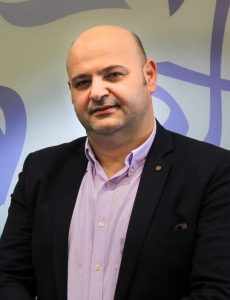
Project Team: Dr. Moutaz Saleh (Lead PI) (Department of Computer Science & Engineering, College of Engineering, Qatar University) Dr. Sumaya AlMaadeed (PI) (Department of Computer Science & Engineering, College of Engineering, Qatar University) Dr. Asma Al-Attiyah (PI) (Dean of College of Education, College of Education, Qatar University) Dr. Hanan Khalil (PI) (Department of Rehabilitation Sciences, College of Health Sciences, Qatar University) Dr. Achraf Othman (PI) (Head of Research & Innovation, Mada Center, Qatar
Project Title: “Multimodal Explainable AI for Inclusive Education in Qatar: A Novel Approach for Specific Learning Disability Diagnosis and Personalized Learning Enhancement”
Grant Category: High Impact Grant
Project Abstract: Specific Learning Disability (SLD) is defined as a disorder in one or more of the basic learning processes involved in understanding or using language, spoken or written, that may manifest in significant difficulties affecting the ability to listen, speak, read, write, spell, or do mathematics. Particularly, Dyslexia which refers to difficulties in reading; Dysgraphia which refers to difficulties in writing; and Dyscalculia which refers to difficulties in math. While Qatar has focused on promoting inclusive education to support students with SLD, the development of a general system that can automatically diagnose and assist is an essential step for improving its education system. This project aims to develop expert systems that use artificial intelligence (AI) algorithms to improve diagnosis and assistance evaluation for children with SLD. The project aims to use multimodal data based on standard activities including physiological, neurological, and behavioral data, to provide accurate and personalized assessments to improve the overall quality of care and assistance outcomes. Generally, two main steps are considered: Diagnosis and Assistance Evaluation. In the diagnosis, data collection for normal and SLD is planned, and an AI expert system based on multimodal data will be implemented. This system should analyze the degree of normality and severity of disability. In the second step, based on the analysis of the diagnosis and the suggestions of the psychologist, intelligent decision-making models will be developed to generate tailored assistance plans for each individual by considering the severity of diagnostic disability, level of motor control impairment, and other related factors that contribute to the learning disability. This step is followed until a significant improvement is seen. The project utilizes advanced technologies and data analysis techniques to develop intelligent decision-making models that enhance the accuracy and efficiency of the assessment process. By integrating innovative methods, such as machine learning algorithms, computer vision, multimodal learning, explainable AI, the system can provide objective and reliable measurements for early identification of SLD in children and suggest appropriate improvement plans in an efficient and timely manner that will contribute to the advancements of the education system in Qatar.
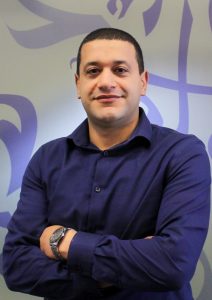
Project Team: Dr. Ahmed Badawy(LPI), Prof. Saeed Salem
Project Title: “Distributed Edge Learning for Secure Healthcare IoT Networks”
Grant Category: Collaborative grant
Project Abstract: Digital healthcare is a rapidly growing domain with a variety of devices incorporated to monitor, assess, and maintain a healthy lifestyle. Therefore, the Healthcare Internet of Things (HIoT) domain presents a great opportunity to enhance the quality of patient care and potentially save lives; however, comes with unique challenges related to network security and data privacy. On the other hand, Distributed Edge Learning (DEL) represents a paradigm shift in data processing by decentralizing both the learning and the model aggregation processes across multiple edge devices allowing them to collaboratively aggregate a single learning model while keeping the data local. DEL’s decentralized nature allows for faster model aggregation, deployment, and later on model updates, which are key advantages for HIoT applications, allowing for faster response time and reduced network congestion. However, given that DEL is a relatively new field, significant research gaps remain, especially in security and data privacy—crucial for healthcare data—requiring further work to ensure the reliable and secure implementation of HIoT systems.
Wishing continued success to all other colleagues in the upcoming cycles!
CSE Faculty Awarded QRDI Grant to Advance Food Security Innovations
September 17, 2024 / Leave a comment
Congratulation to Dr. Cagatay Catal and his team for securing a grant through Qatar Research, Development and Innovation Council (QRDI) for food security call.
The granted project is titled “Artificial Intelligence-Empowered Aquaponics: Empowering Food Security for a Sustainable Future”.
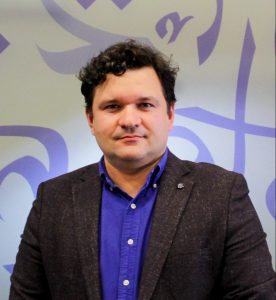
The Project team includes:
- Prof. Dr. Cagatay Catal (Lead PI) (Department of Computer Science & Engineering, College of Engineering, Qatar University)
- Prof. Dr. Nader Meskin (PI) (Department of Electrical Engineering, College of Engineering, Qatar University)
- Prof. Dr. Ahmed Khalifa (PI) (Department of Finance and Economics, College of Business and Economics, Qatar University)
- Assoc. Prof. Dr. Mohammed Hussain S A Alsafran (PI) (Agriculture Research Station, Qatar University)
- Dr. Yamine Bouzembrak (PI) (Information Technology Group, Wageningen University & Research, The Netherlands)
- Assoc. Prof. Dr. Turker Bodur (PI) (Department of Aquaculture, Faculty of Fisheries, Akdeniz University, Türkiye)
Project Abstract: The objectives of this project are to advance the efficiency, scalability, and reliability of aquaponics systems through the integration of Artificial Intelligence (AI), Machine Learning (ML), Computer Vision (CV), and Internet of Things (IoT) solutions. The project aims to address key challenges in aquaponics, including fish health monitoring, plant disease detection, and environmental monitoring. The project team, in collaboration with Wageningen University & Research in the Netherlands and Akdeniz University in Türkiye will develop Qatar’s first comprehensive research setup for aquaponics. This research setup will be deployed at the Agricultural Research Station of Qatar University. The expected outcomes of this project are two-fold. Firstly, it will result in the development of novel prediction models and innovative technologies that address the challenges in aquaponics. These models and technologies will contribute to enhanced fish health, optimized crop production, and improved overall system efficiency. Secondly, the project aims to empower sustainable food security by minimizing the environmental impact of agriculture. By reducing water usage, nutrient runoff, and pollution, AI-empowered aquaponics will offer a more sustainable alternative to traditional farming methods.
The QRDI and the Ministry of Municipality (MoM) have launched the Food Security Call to support research that aligns with Qatar’s National Food Security Strategy, fostering collaboration among experts to develop solutions for the country’s food supply challenges.
CSE faculties and students awarded at CENG 2024 End of Year event
June 2, 2024 / Leave a comment
The College of Engineering held its End of Year event on May 28, 2024, where several CSE faculty members and students were honored with awards.
The graduation projects competition of all engineering senior students was part of the CENG End of Year event. The competition included two categories: Best Project Design and Best Project Marketing Presentation. The first place in the Best Project Design category was awarded to the project titled “Vaultexe/OSS Zero-knowledge Self-hosting Password Manager” from the Computer Science program. This project was created by students Ahmed Abdou, Husam Snober, Mohammed Saqallah, and Walid Ben Ali, under the supervision of Dr. Moutaz Saleh.
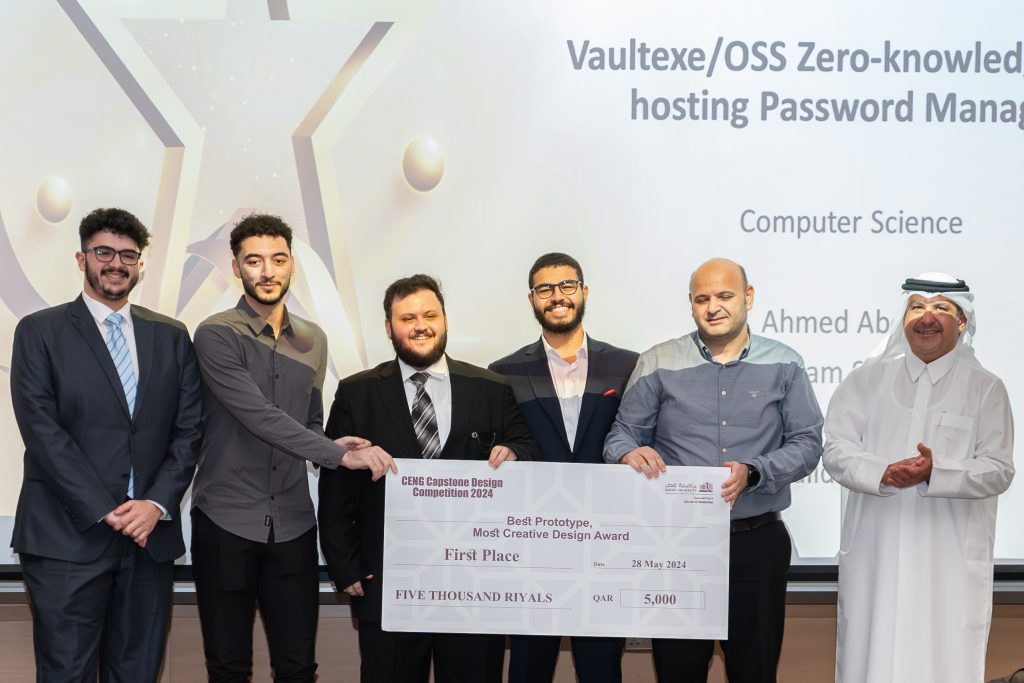
In the Best Project Marketing Presentation category, the third place was awarded to multidisciplinary graduation project titled “Q-SAR: Drone Swarm for Disaster Management”. The team included students Ali Yasser Ali Abdolwahab , Abdalla Mostafa Shaaban , and Assem Malek Alnajjar from Computer Engineering Program. Moslem Yaser A Al- Qawasmi, and Yaman Yasser Kutmawi from Computer Science Program, Khaled Abdelrazak Khaled, Khaled J L Barakah, Omar Hakam Ahmad, and Abdullah Khalid AL Mawed from Electrical Engineering Program. The project is supervised by Prof. Amr Mohamed, Dr. Wadha Labda, and Prof. Ahmed Massoud.
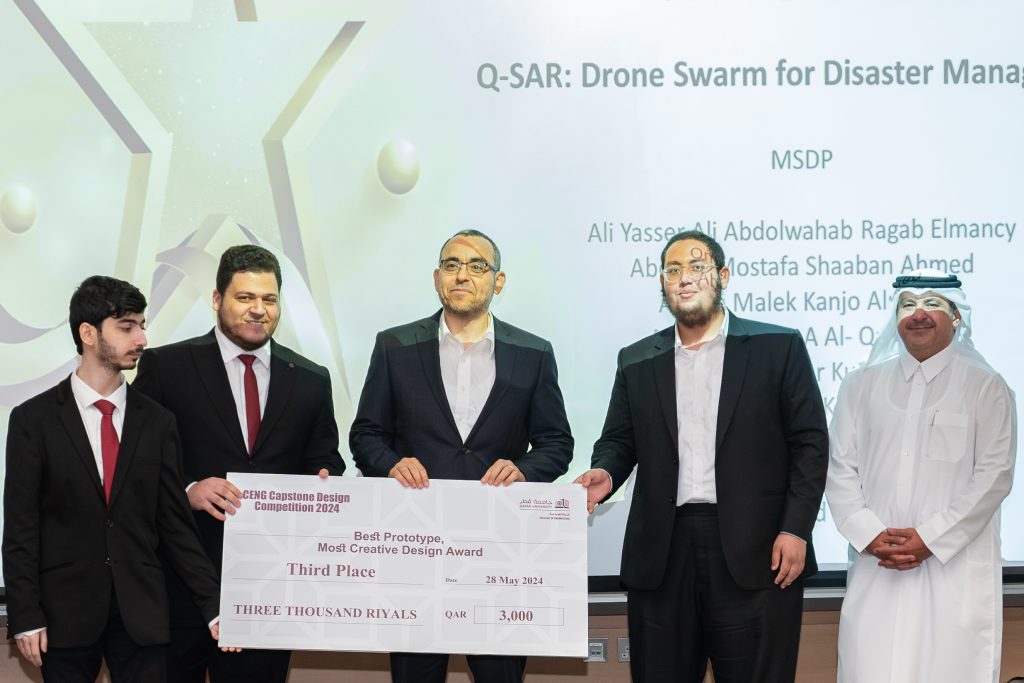
The Dean’s Awards for the academic year 2023-2024 were also presented. Prof. Junaid Qadir received the Dean’s Award for Research, and Dr. Saleh Al-Hazbi was honored with the Dean’s Award for Teaching. Additionally, Dr. Mohammed Saleh and Prof. Elias Yaacoub were recognized as internal judges for the Best Prototype and Most Creative Design competition.
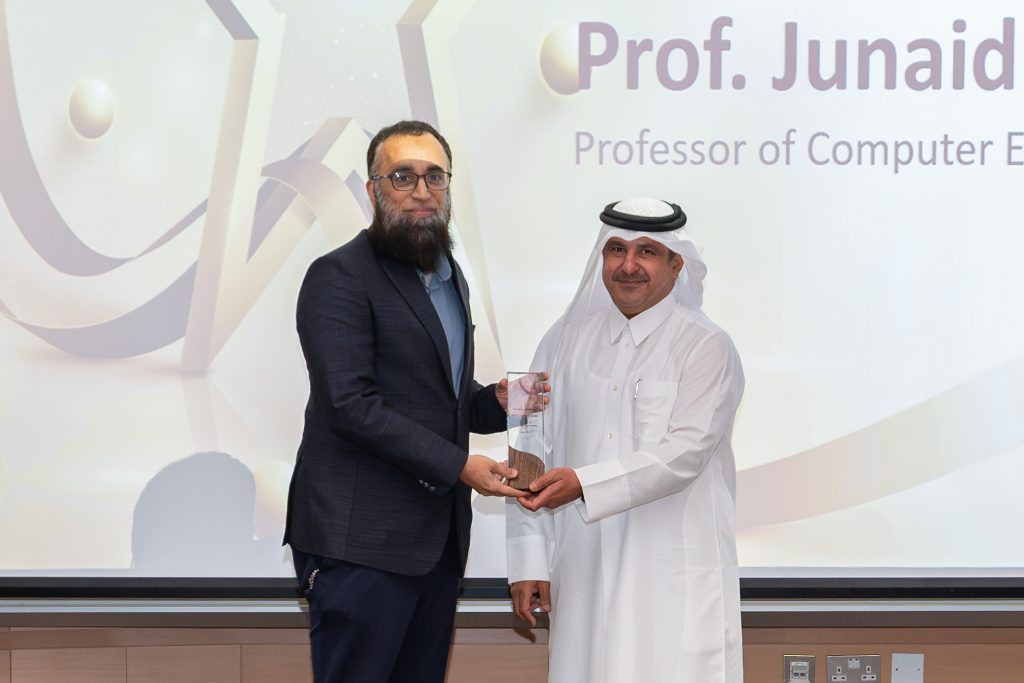
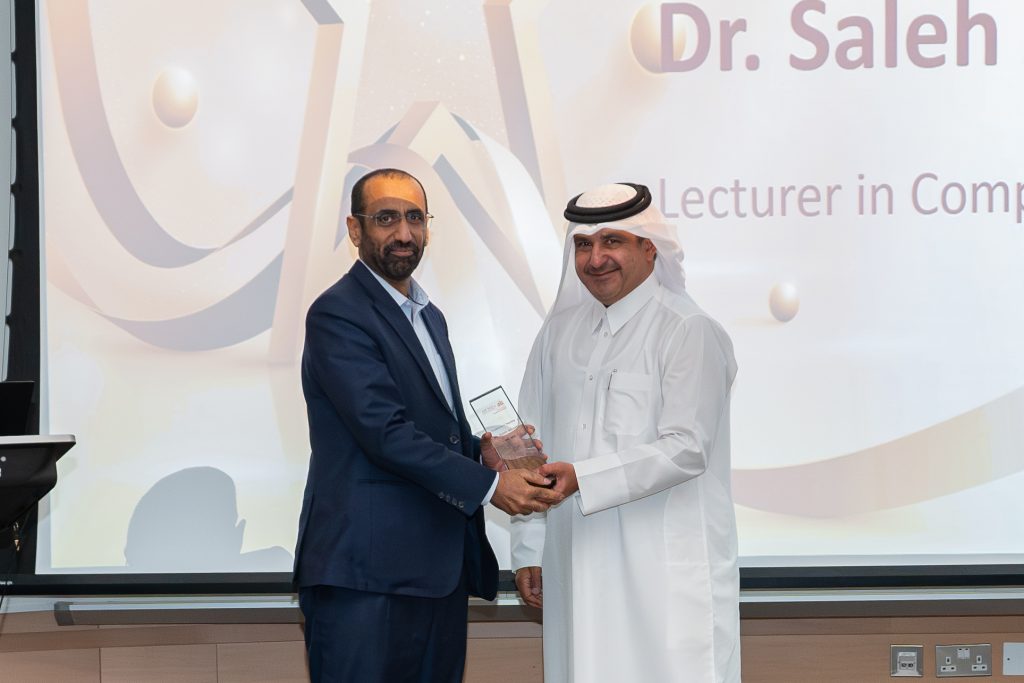
Lastly, Dr. Hazem Kemal was acknowledged by the College of Engineering for the completion of his tenure as a visiting professor in the CSE department.
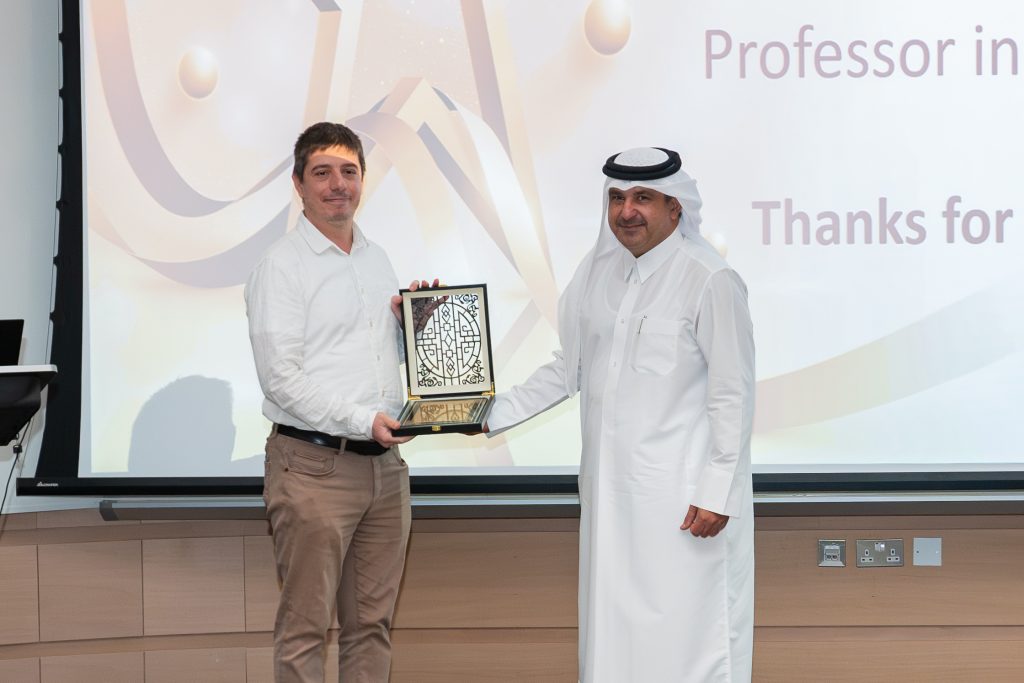
Congratulations to all of the awarded CSE students and faculties!
Project to Enhance ‘Digital Citizenship’ in Qatar
May 29, 2024 / Leave a comment
Dr. Osama Halabi an associate professor in Computer Science and Engineering department is one of the leads of a project titled “Future of Digital Citizenship in Qatar: A Socio-Technical Approach”.
The project is a four-year research initiative done by Msheireb Museums and Hamad Bin Khalifa University (HBKU) as a significant step towards promoting responsible digital citizenship and enhancing positive online community engagement in Qatar.
The project is funded by the Qatar Research, Development, and Innovation Council (QRDI). The initiative comprises six sub-projects led by experts in their respective fields, bringing together more than 60 researchers.
The project’s tangible outputs include web interfaces for public analysis of social media, detection of hate speech, discrimination, and propaganda, as well as training materials and ambassadors to educate students on digital literacy, propaganda detection, safety, well-being, and social inclusion.
Dr. Osama Halabi, highlighted the importance of social media literacy and the project’s focus on assessing public attitudes towards social media in Qatar. The project’s findings, which will be primarily presented in Arabic, are expected to provide deeper insights into the variations between Qatar, the Arab world, and Western countries regarding technology and social media acceptance.
Msheireb Museums and HBKU’s commitment to integrating technology with academia and emphasis on sharing research findings with the public through events, exhibitions, and community engagement activities demonstrate their dedication to fostering a more sustainable and inclusive digital environment in Qatar.
This collaborative effort between academia, museums, and the community is a promising endeavor that has the potential to impact digital citizenship and online community engagement in Qatar significantly. The initiative’s focus on responsible digital citizenship and positive online engagement sets a commendable example for other regions and countries.
